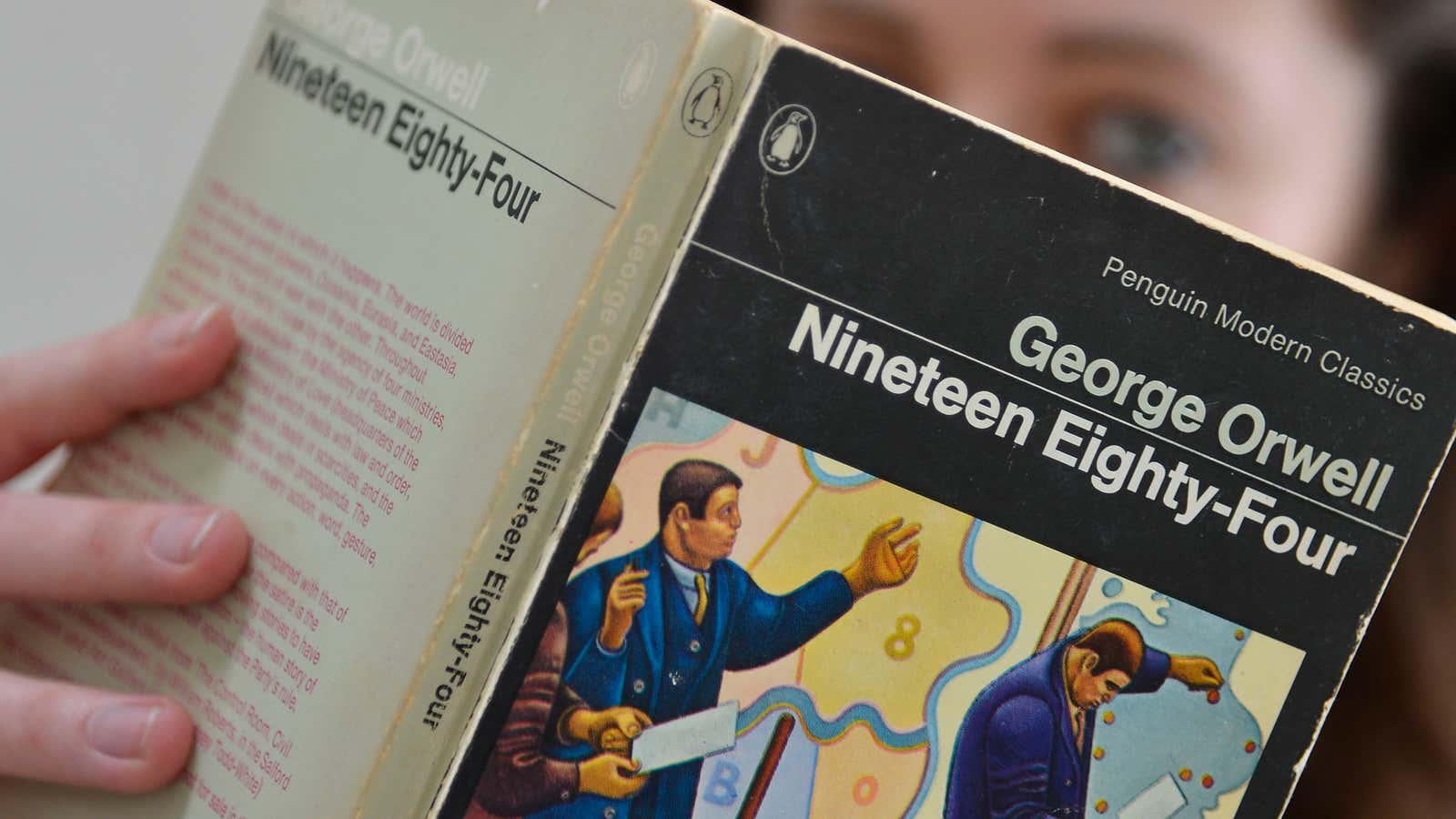The word of the year is “post-truth,” according to Oxford Dictionaries. Post-truth has been used a lot in 2016 to describe the successful Brexit and Donald Trump campaigns, both of which were based in a systematic misrepresentation of facts. The definition, according to Oxford, is “Relating to or denoting circumstances in which objective facts are less influential in shaping public opinion than appeals to emotion and personal belief.” But post-truth could also be defined by a simple one-word synonym: propaganda.
“I think propaganda needs to return to common parlance,” says Michael J. Socolow, a professor of journalism and communications at the University of Maine. “We have so many euphemisms today for propaganda. We have ‘native advertising,’ ‘sponsored content,’ ‘public diplomacy,’ ‘fake news,’ and ‘post-truth’ content: They’re all variations on propaganda, what they identified in the 1920s and 1930s.”
The invention of new words and phrases to conceal old evils is itself an old evil. Politicians and pundits, as always, seek out new innocuous phrases in an effort to dampen the revulsion of recognition. “In our time, political speech and writing are largely the defence of the indefensible,” George Orwell famously wrote in 1946.
But the euphemism post-truth is perhaps especially, depressingly appropriate, because it is itself a sign of a time when snappy jargon is being used to obscure both the truth and the continuity between past and present. It’s also a big linguistic step in the wrong direction. Now more than ever, Americans generally—and the media especially—need to stop trying to affix gleaming chrome on old corruption.
In its current form, the term post-truth was first used in 1992 in an essay in The Nation, as best as Oxford Dictionaries has been able to determine. But the majority of people, especially those who don’t obsessively read the internet, probably don’t know what post-truth is—and wouldn’t necessarily agree with the term if they did. “The idea of post-truth is that it implies that truth is over,” Socolow explains. “120 million Americans voted in this past election, and I’m not ready to say that a significant number of them believe, on either side, that we’ve moved past truth in that way.”
It’s also telling that one of the runners-up for Oxford Word of the Year was “alt-right.” Defined by the dictionary as, “an ideological grouping associated with extreme conservative or reactionary viewpoints, characterized by a rejection of mainstream politics and by the use of online media to disseminate deliberately controversial content,” a simpler definition might just be ”neo-Nazis.” Like post-truth, the term alt-right presents itself as defining a new phenomenon: Here is a controversial, alternative—and, depending on who you ask, cool—conservative movement, born out of the internet age. And also like post-truth, the alt-right is really just a new phrase for an old totalitarian phenomenon.
No wonder then that these new words, in form and content, recall Orwell’s old words—specifically some of the newspeak from 1984. “Crimethink,” “thoughtcrime,” and “unperson”—reading that list makes it seem like Orwell could have invented post-truth himself. They even sound the same, with their simple, thunk-thunk construction of single syllables mashed together. The sheer ugly clumsiness is supposed to make the language seem futuristic and cutting edge. The world to come will be utilitarian, slangy, and up-to-the-minute in its inelegance. So the future was in Orwell’s day; so it is in 2016.
“I think the prefix “post’ has special resonance in light of post-modernism, post-humanism, etc.,” Nathan Atkinson, an assistant professor at Georgia State University, explains by email. “It implies an end and a transcendence all at once.” The internet age is thrilled by, and obsessed with, the idea of rapid change—whether utopian or dystopian. Post-truth implies we’ve slipped into a bleak tomorrow, in which information is so ubiquitous and uncontrolled that truth has no meaning. Similarly post-racial—which became a prominent buzzword after president Barack Obama’s election—implied that racism no longer exists.
Either way, there’s an excitement in believing that society is rapidly progressing and that history no longer has a hold on us, for better or worse. But this is just another example of obfuscation—or post-truthiness, if you prefer. When Donald Trump lies about having prevented a Ford plant from moving to Mexico, he’s not inventing a new relationship to the truth: He’s simply spewing propaganda, the way Mussolini did when he claimed that he made the trains run on time.
Fascism thrives on falsehoods: The promise that this highly efficient new governing philosophy is ushering in a gleaming future, cleansed of the detritus of lesser peoples and weaker ideologies. Terms like post-truth and alt-right seem to provide a modern twist, though they come from the same fascist playbook as ever.
In the age of Trump, we need our rhetoric to be more clear and more ruthless than ever before. Instead of new words, we need language that reminds us that the present is built on the past, and that history continues to matter, analytically and ethically. The idea that we have moved past truth and past decency is simply a convenient political lie. Which is to say: It’s propaganda.
Correction: A previous version of this post incorrectly stated Nathan Atkinson’s current university and position.
